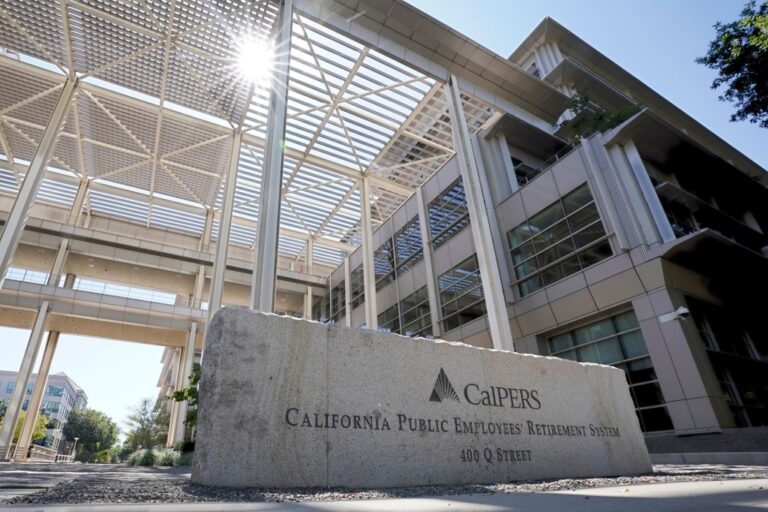The sun rises over the California Public Employees Retirement System building in Sacramento, California, on Tuesday, Sept. 6, 2022. (Photo by The Associated Press/Rich Pedroncelli)
CalPERS recently announced its intention to vote against all 12 Exxon directors and CEO Darren Woods at the oil company’s shareholder meeting next Wednesday for attempting to “silence” shareholders. The move comes as the company has taken two ESG activists to court for putting forward tough climate change action plans. Unfortunately, the decision is just another political ploy by CalPERS, which has a history of using state retirees’ pensions to score political points rather than focusing on ensuring state employee benefits.
CalPERS criticized Exxon for filing suit in federal court instead of seeking approval from the Securities and Exchange Commission (SEC) to remove from the annual meeting a proposal intended to “downsize” the company, which would ultimately harm shareholders.
CalPERS argued in its statement that the SEC is a fair forum, but neglected to mention that the SEC has done everything in its power to allow frivolous shareholder proposals to appear on companies’ proxy ballots. Since the Biden Administration took office, SEC Chairman Gary Gensler has pursued rules and policies that make it easier for activists to submit shareholder proposals to advance their ideological agenda, rather than providing a forum for shareholders to propose ideas that will increase shareholder value.
Specifically, in 2021, the SEC changed its policy governing which shareholder proposals it allows on corporate ballots to explicitly allow proposals that address issues with “broad societal significance.” Previously, the SEC only allowed these types of proposals if the issue in question directly related to the target company, and placed further limitations on how prescriptive a shareholder proposal could be to ensure that management had the discretion to implement business strategy.
Since the change, an unprecedented number of proposals dealing with progressive political causes like climate, diversity, equity and inclusion have been put to the ballot and consistently rejected by shareholders. Last year, the change led ESG advocate BlackRock to say that it would result in lower quality shareholder proposals and fewer proposals supported by asset managers, as many of the proposals were too prescriptive despite generally supporting the environmental and social goals they addressed.
In light of these circumstances, Exxon has decided to ask the court to interpret the SEC’s shareholder proposal rules to provide a more unbiased review. Given the ever-changing interpretation of the SEC’s shareholder proposal rules and the increasingly politicized nature of proposals, judicial review is desperately needed. If successful, Exxon would greatly benefit not only its own shareholders, but all public company shareholders.
What Exxon is asking the court to do is simple and uncontroversial: protect the public markets by approving rules governing a shareholder proposal process that aims to foster greater cooperation between shareholders and companies, rather than creating a corporate-funded forum for activists to vent their anger.
Exxon’s recent track record suggests the company is focused on short-term and long-term returns for shareholders. In fact, Exxon is on track to post record profits of $7.6 billion in 2022 and another strong year in 2023, allowing it to pay out roughly $15 billion in dividends to investors in 2023 alone.
Unfortunately, California public employees are not as lucky as those who invested directly in Exxon. CalPERS has bowed to political pressure and consistently performed poorly. From mid-2022 to mid-2023, CalPERS investments returned just 5.8%, outperforming the 17.6% earned by S&P 500 investors, according to a Pacific Legal Institute report. This poor performance follows what CalPERS’ investment chief called a “lost decade,” during which the fund failed to invest in private equity and lagged peer pension funds in nearly every asset class.
Perhaps CalPERS should follow Exxon’s example and focus on its core function of making good investments for California’s hardworking public servants, rather than using pensions to signal its moral credentials to environmental activists.
Stephen Bainbridge is the William D. Warren Professor Emeritus at the UCLA School of Law.

